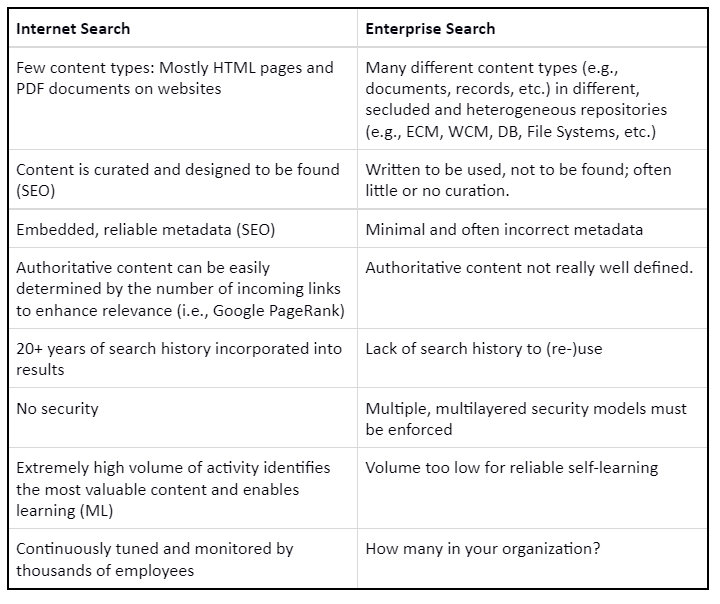What is search relevance?

Search relevance measures how closely the results of a search relate to the user’s query. When a user enters a search, it means they are looking for answers. Search results that better match what the user is hoping to find are more relevant and should appear higher on the results page.
In recent years, advanced internet search engines such as Google have raised user expectations. When users enter a query, they expect a high-quality user experience (UX). They want the search results to be accurate and also highly relevant to their query.
But many enterprise search platforms today lack the ability to understand the user’s intent and deliver relevant search results.
How Is Enterprise Search Relevance Different?
Enterprise search is markedly different from internet search . For example, while the internet mostly consists of easily accessible HTML, video or PDF pages, enterprise search must contend with hundreds of different types of content scattered across different repositories.
The following table makes a parallel between Internet Search and Enterprise Search from a pure relevance optimization perspective:

In enterprise search, relevancy is more than the order of answers or how well they align to the query. What matters is how well the search experience helps the user accomplish a goal or task. Relevant enterprise search systems are those which succeed in boosting innovation, increasing productivity, improving customer service, and helping decision making.
Why Is Search Relevance Important?
Search results with a higher relevance score lead to more satisfied and more engaged users. Users who can quickly find the information they’re looking for are more likely to take the next step and repeat the search experience regularly. Depending on the audience, that could mean prospects converting into customers, team members completing work assignments, or executives making mission-critical decisions.
Many factors can cause users to see results unrelated to their query and make it difficult for them to get the answers they need. Frustrated users are more likely to use a different channel to find the right information, even if it takes more time. This is why search relevance is such an essential part of the enterprise search user experience (UX).
What Factors Affect Search Relevance Optimization?
Delivering highly relevant results and avoiding a frustrating user experience requires presenting search results in the order that is most helpful. But usefulness can differ between users and their professional situation.
Ranking search results to make them relevant for a particular query is a complex process. That’s because relevance algorithms are set up with help from many variables that often change according to the expectations.
Queries can often be ambiguous because the user’s intent may not be obvious. Without additional context, it can be difficult to understand exactly what kind of answers they are looking for.
For example, different users may phrase the same query in different ways. On the other hand, different users might enter exactly the same query even though they are looking for different results. With the same query, one user could only try and retrieve a given document. On the other hand, the second user is searching for a very precise answer, and a third one is seeking for a broad overview of a given subject.
That is why relevance score can be affected by a number of factors, such as:
- A common statistical algorithm to try and retrieve the query terms at best, which is itself made of multiple variables that optimize the ranking with help from indicators like term frequency (TF) and the number of documents containing the term itself (IDF).
- Natural language understanding (NLU) capabilities, to be more flexible on the matching between search terms and document words, and better manage search variants . NLU capabilities are highly dependant on the user language.
- Personalization, including past user preferences, search history, browsing behavior, or individual location.
- Search terms that are close to each other within a document.
- Synonyms and word variants with similar meanings.
- Spelling correction for misspelled words or spelling variants between U.S. and U.K. users.
- Phonetic spelling for other terms with similar pronunciation.
- More recent documents, more important documents parts, or more important data sources according to business rules.
- Higher or lower user ratings for particular documents or results.
- and many other relevance factors which depend on the expected enterprise search solution.
The challenge then comes to the best factors combination. The aim is to maximize the chance of providing to the user the best search experience without knowing anything of his current query intent.
About Search Relevance Measure and Optimization
Relevance is not only complex but also a gray area. What is relevant to one person may not be relevant to another. Queries can be phrased in many different ways, and the nuances of query formulation can bring about differences in results. Because of the subjectivity of users, the plurality of needs and expectations, and even the data being indexed, there is no such thing as an absolute value for it.
Relevancy is hard to measure accurately and cannot be compared between different systems. Only the trend of your indicator(s) will help you understand if and when your system improves and when it does not.
While Internet search is regularly improving, you all want to make your Enterprise search users happier, your search experience better, and your relevance greater. But how do we determine that the system is improving?
The bottom line is that there is no absolute scoring method for search relevance. But while relevance is often subjective, it can still be improved over time with help from explicit or implicit user’s feedback.








